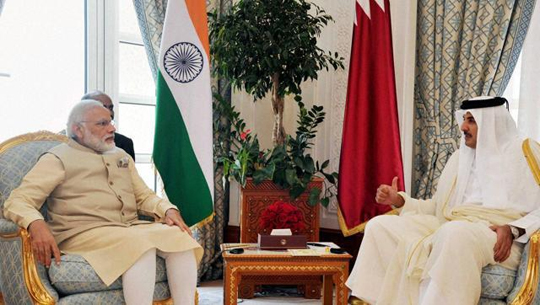New Delhi, Jun 7: With Qatar Emir Tamim Bin Hamad Al Thani pardoning several prisoners for Ramadan, including 23 Indians, Prime Minister Narendra Modi has expressed his gratitude to the Emir.

“A special gesture to mark the start of a special month...the Government of Qatar releases 23 prisoners, who will return home to India. My deepest gratitude to the Emir of Qatar for the gesture.” tweeted Prime Minister Modi, who is in Washington on a bilateral visit at the invitation of President Barack Obama.
A special gesture to mark the start of a special month...the Government of Qatar releases 23 prisoners, who will return home to India.
— Narendra Modi (@narendramodi) June 6, 2016
My deepest gratitude to the Emir of Qatar for the gesture.
— Narendra Modi (@narendramodi) June 6, 2016
“HH the Emir Sheikh Tamim bin Hamad Al-Thani issued an Emiri gesture pardoning a number of prisoners on the occasion of the Holy Month of Ramadan,” reported Qatar News Agency.
Though official figures have yet to be released, many of the pardoned prisoners, typically hail from nations that have a lot of nationals here, including India, Nepal, Bangladesh and the Philippines, said Doha News, adding Sheikh Tamim Bin Hamad Al Thani typically pardons inmates twice a year, including National Day on Dec. 18.
Those who are freed have usually already served a significant portion of their jail terms and the pardons are seen as a sign of goodwill toward Qatar's large expat population, said embassy officials.
More information about those who are pardoned will be sent to their respective embassies in the coming weeks.
Nearly 100 people were pardoned during Ramadan for crimes related to theft, possession of drugs and fraud, among other crimes in previous years.
On Sunday, Prime Minister Modi concluded his visit to Qatar, where he held meetings with business leaders and the Emir of Qatar, followed by signing of agreements, a lunch hosted by the Emir, a meeting with the father Emir and an interaction with the Indian community.






Comments
Ha Ha.......Always running behind credit......PM saheb please come back.
All the Gulf nations releases prisoners (not criminals) from jail...its normal....You dont have to go and sit there for it....Do some work here..
People are looking for a Bajrangee Bhaijan to bring you back...ha ha.
Emir typically pardons inmates twice year on Ramadan and National Day. It has nothing to do with PM visit.
He has pardoned not released them yet, it will take place in a couple of weeks, another feku screw-up.
Add new comment